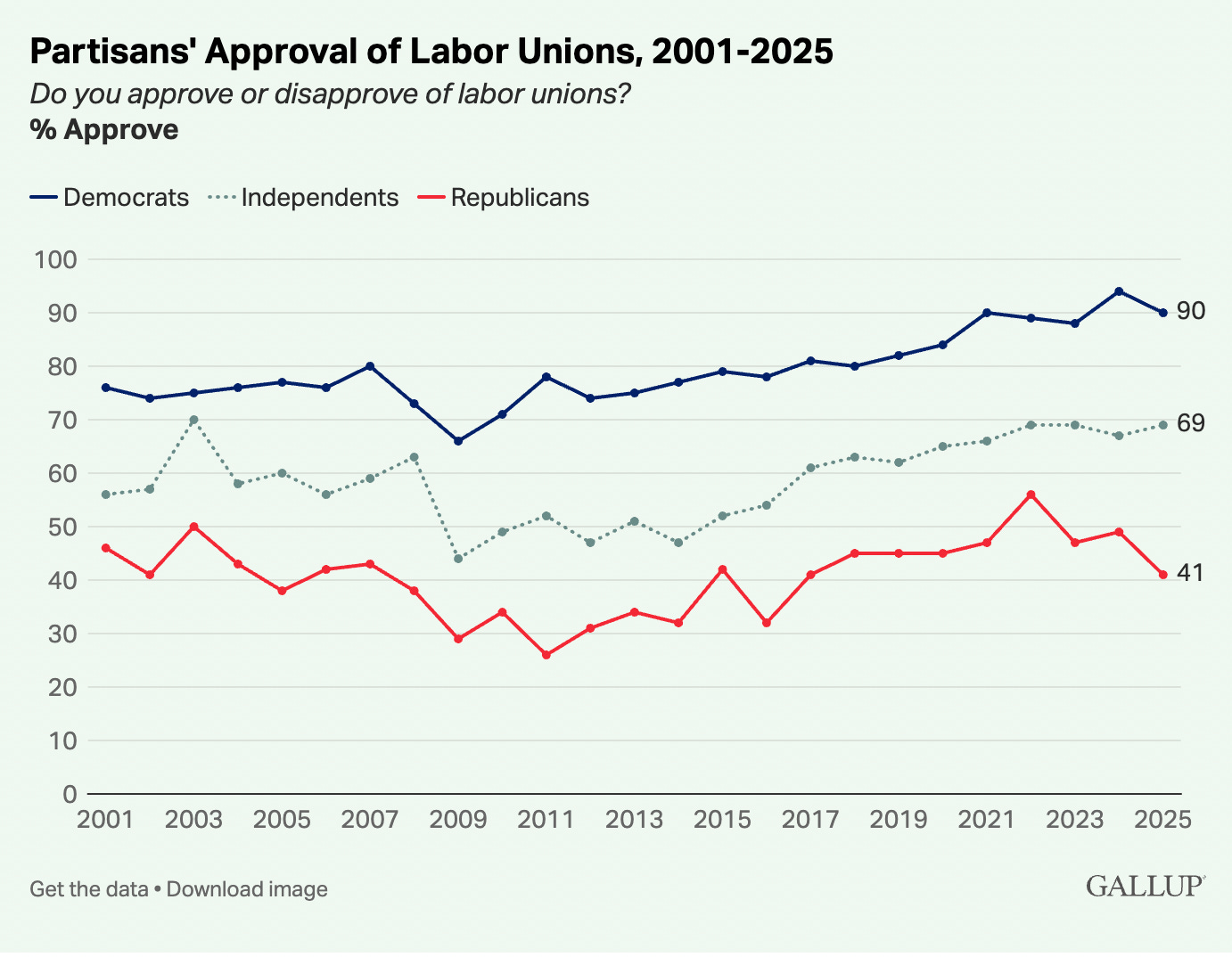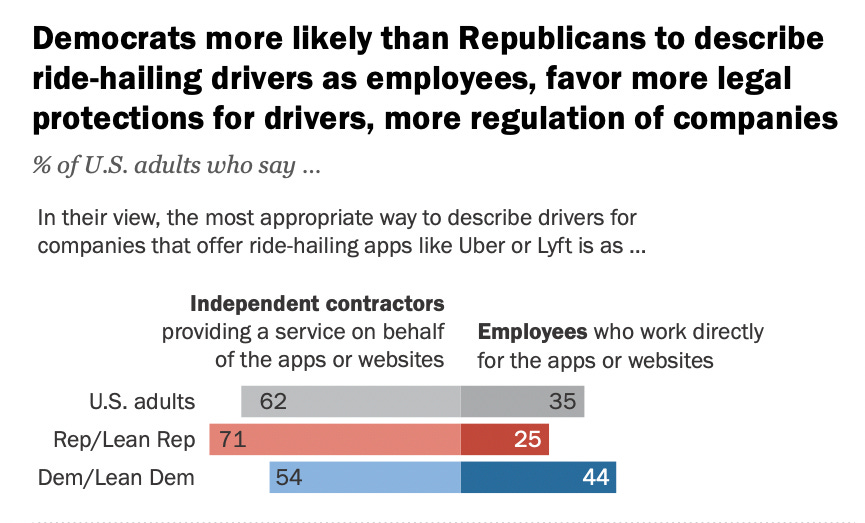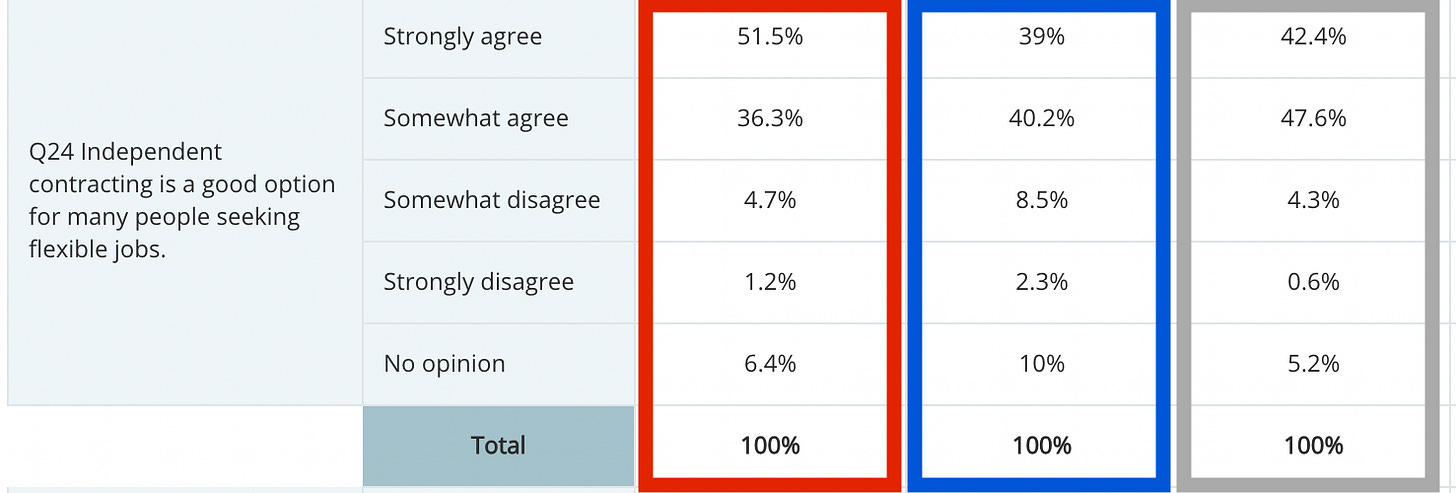The All-Important Question
In new NJBIA reporting, gubernatorial candidate Mikie Sherrill appears to contradict her record on independent contractors. Here's my theory why.
For the upcoming October issue of New Jersey Business Magazine, the New Jersey Business & Industry Association asked both of New Jersey’s gubernatorial candidates for their positions on the Department of Labor & Workforce Development’s proposed independent-contractor rule.
The NJBIA released the responses online a few days ago. There are no surprises in the answer from Republican Jack Ciattarelli, who has long taken a strong stance on protecting everyone’s freedom to be independent contractors:
“I'm a free market guy, and I think that our state economy is best served when there's balance,” Ciattarelli said. “What I mean by that is 1099, and W2, union and non-union jobs.
“I do not support (the proposal). It would be dead on arrival under Governor Ciattarelli. My medical publishing company would never have survived if I wasn't able to use independently contracted scientific writers to produce content for continuing medical education that it provided to physicians.
“That's just one space under the umbrella of independent contractors. ... I do not support the movement,” Ciattarelli said.
But the response from Democrat Mikie Sherrill was surprising.
Sherrill, as a member of Congress, is a co-sponsor and strong supporter of the Protecting the Right to Organize Act. The PRO Act is a bill that would spread California-style freelance busting nationwide, threatening the livelihoods of independent contractors in a way that former National Labor Relations Board Chairman Philip Miscimarra wrote “would substantially unravel and change large segments of the U.S. economy.”
That same freelance-busting regulatory language is the basis of the currently proposed rule-making at the New Jersey Labor Department—which means that Sherrill, to be consistent with her long-held position and the Democratic Party’s platform, would be expected to support the state Labor Department’s proposal.
Instead, Sherrill appeared to say something different when she told New Jersey Business Magazine:
“Businesses are worried that they are going to go under because of this,” Sherrill said. “I've heard from truckers who are saying, ‘I'm afraid I'm going to lose my job.’
“That’s not what we want to see under this proposal. I'm going to review this when I get into office and have both businesses and workers at the table as we make sure regulations can help grow business and keep people employed.”
I had an educated guess about why Sherrill waffled. I reached out to Bob Considine, who is chief communications officer at the New Jersey Business & Industry Association. I asked him to share with me the exact question that he posed to Ciattarelli and Sherrill to elicit these responses.
My guess was that his question did not include the words “union” or “Uber.”
I was dead-on right.
Here’s how I knew.
Bubble Brains
Protecting our freedom to be our own bosses should not be a partisan issue.
This statement is common sense to me. It’s common sense to pretty much everybody else, too, given the 99% opposition to New Jersey’s proposed independent-contractor rule.
Every single one of us in these great United States has always had the freedom to hang out a shingle and go into business for ourselves. About two-thirds of Americans say we’d prefer to be our own bosses. I don’t know how many times I’ve uttered that phrase—Protecting our freedom to be our own bosses should not be a partisan issue—and thought nobody could possibly argue with it.
But far too often, when I say it, I might as well be screaming “Operator!” at a customer-service bot. An unbelievable number of people—including a ton of lawmakers—in our polarized political culture simply cannot compute this message. The partisan translator chip in their brains warps what I’m saying into something else entirely.
I say: Protecting our freedom to be our own bosses should not be a partisan issue.
They think: This person is a right-wing lunatic who hates labor unions.
Recent Gallup research helps to explain why. Gallup asks people how they feel about labor unions right around Labor Day every year. In this year’s results, which were released in late August, 68% of adults said they approve of labor unions. That’s about the same as the past five years.
This year’s survey also broke down approval of labor unions by political party. Look at the stark difference between Democrats and Republicans:
The Democrat-Republican divide in Gallup’s research is reminiscent of a chart that Pew Research Center published in 2021 about independent-contractor policy.
Pew’s researchers asked whether people doing work for app-based companies should be considered independent contractors or employees. The series of questions Pew asked specifically included the words “Uber” and “Lyft,” which are companies that union organizers often specify as problematic when they urge government officials to reclassify independent contractors as employees.
That union-side language is important, because it’s been drilled into a lot of people’s brains for years now. People who are Democrats, or who lean Democrat, are more likely to hear talking points about independent contractors that come from the union perspective. Media outlets like MSNBC and The New York Times take stances against Uber and Lyft, and the gig economy in general, while promoting unions and the PRO Act in stories like this one and this one. Additional examples of this left-leaning media narrative about independent contractors can be found in The Nation, The New Republic and Mother Jones.
It’s a narrative that wildly diverges from what most business owners and independent contractors say, and from what most app-based workers say—all perspectives that are more likely to be presented in Republican- and conservative-leaning media. The Wall Street Journal, Fox News, The Washington Examiner, National Review and American Spectator all generally cover independent-contractor policy from this entirely other perspective.
The result is that in the minds of many people whose media intake is limited to left-leaning brands, “Uber” and “Lyft” are now synonymous with “independent contractor” and “victim.”
Which is a big reason why Pew found this when it asked about independent-contractor policy from that perspective:
And once that belief is embedded—that independent contracting is not a choice that millions upon millions of us embrace, but instead a gig-economy problem that needs to be fixed—it’s easy to forget that what we’re really talking about with freelance busting is our government trying to restrict everyone’s freedom to be our own bosses. The belief instead becomes that our government would be doing a good thing if it reclassified independent contractors as employees.
You can press zero and try to get back to the operator all you want. It’s almost impossible to get someone out of this belief system’s loop. Challenging the belief actually makes a lot of left-leaning union supporters dig in even harder.
The clearest example I’ve ever seen of this was on Capitol Hill in 2024. It happened during this exchange between Republican Congressman Kevin Kiley and Democratic Party witness Katie J. Wells:
It matters how questions are phrased when it comes to independent contracting. In fact, when you remove the dog-whistle terms from the questions altogether, you get entirely different responses.
This past May, the Independent Women’s Forum released the results of polling that asked if independent contracting is a good idea for people who want flexibility in the way they work.
Look at how little difference there is the responses among Republicans (red), Democrats (blue) and Independents (gray) when the question is asked without any references to unions, Uber or the gig economy:
Most Americans really do agree on this policy area. All of which makes it far less surprising that there is 99% opposition to New Jersey’s proposed rule to restrict independent contractors.
What the NJBIA Asked Sherrill and Ciattarelli
One of the following three questions is the actual language that New Jersey Business Magazine used when it asked the gubernatorial candidates about the state Labor Department’s proposed independent-contractor rule.
See if you can spot it:
Independent contractors, unlike employees, cannot join a union. Do you support the NJDOL’s proposal to interpret the ABC Test so that more of these people will be classified as employees with the freedom to join a union?
Uber and Lyft make billions off the backs of gig workers. Do you support the NJDOL’s proposal to interpret the ABC Test in a way that would give these gig workers the status of employees?
The NJDOL has proposed significant changes to the current ABC Test that would drastically reduce the number of independent contractors in the state. Where do you stand on the issue?
The third question is the real one.
Which is, in my opinion, very likely why Sherrill answered the way she did, about businesses and independent contractors being concerned. When freelance busting is presented as what it actually is, almost nobody supports the policy concept.
Yes, that includes lawmakers who have voted for it in the past. We also heard U.S. Senators Tim Kaine and Andy Kim do this kind of waffling in July, when I testified before them on Capitol Hill about how policymakers were weaponizing regulatory language to attack independent contractors. That’s how I said it, and the result was similar to what happened with Sherrill and the NJBIA. Senators Kaine and Kim, both also Democrats and PRO Act co-sponsors, heard the policy issue presented from the perspective of independent contractors. They, too, indicated that hurting us might actually be a bad thing.
Say it with me now, one more time with gusto: Protecting our freedom to be our own bosses should not be a partisan issue.
Press zero or say “operator” if you would like to return to the main menu or hear this message again.





